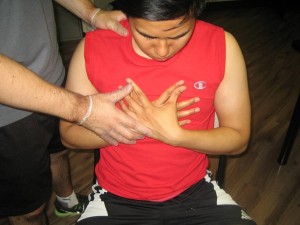Gastritis is the inflammation in the stomach lining. It is important to note that the Helicobacter pylori bacteria is considered as the most common cause of gastritis which also occurs due to overuse of anti-inflammatory medications, autoimmune condition or excessive bile in the stomach. The usual symptoms of gastritis include vomiting, heartburn as well as indigestion and appetite loss.
If you will register for first aid training today, you can readily manage the symptoms of this condition with ease. It is best that you are prepared with the steps to take once an individual experiences an attack of gastritis.
Inflammation

Foods that are rich in fat will increase inflammation in the stomach. The individual should avoid fried foods and processed foods made with saturated and trans fats as well. Additionally, margarine as well as commercial baked goods contains trans fats.
Healthy fat
It is important to note that fats are vital and must be part of the diet if an individual has gastritis. Nevertheless, it is best to choose healthy fats which include polyunsaturated fats and monounsaturated fats present in olive oil, nuts, peanut butter and seeds. A type of polyunsaturated fat, omega-3 fatty acid is highly beneficial for the health. Even fatty fish such as salmon is a rich source of this fat. The individual must select fatty fish and lean meat instead of fatty meats that are packed with saturated fat.
Level of tolerance
Even though fatty foods do not cause gastritis, the individual might find some foods more tolerable than others. The individual must base on his/her own experience as a guide and avoid fats that cause discomfort. Remember that there is no single diet that works for everybody with digestive issues. Aside from fatty foods, the individual must also reduce intake of foods and beverages that are very acidic such as tomatoes, coffee, cocoa, hot peppers and chocolate. Alcohol and citrus juices can also trigger severe side effects. Additionally, spices such as onions, cloves, garlic and cinnamon can irritate the already damaged stomach lining.
Treatment
Over-the-counter antacids can provide fast relief if the individual indulges on his/her favorites. By taking an antacid before or after eating fried foods, it helps reduce the severity of the symptoms. At the same time, if the individual is currently using other medications to clear up the H. pylori bacteria and treat the condition, a doctor must be consulted prior to the use of antacids.
Take note that antacids can disrupt the proper absorption of some medications which makes them ineffective. The over-the-counter medications that help relieve the symptoms caused by consuming fatty foods include magnesium or aluminum hydroxide, calcium carbonate and sodium bicarbonate. Antacids must be taken at least 2 hours after or an hour before taking the medications.
